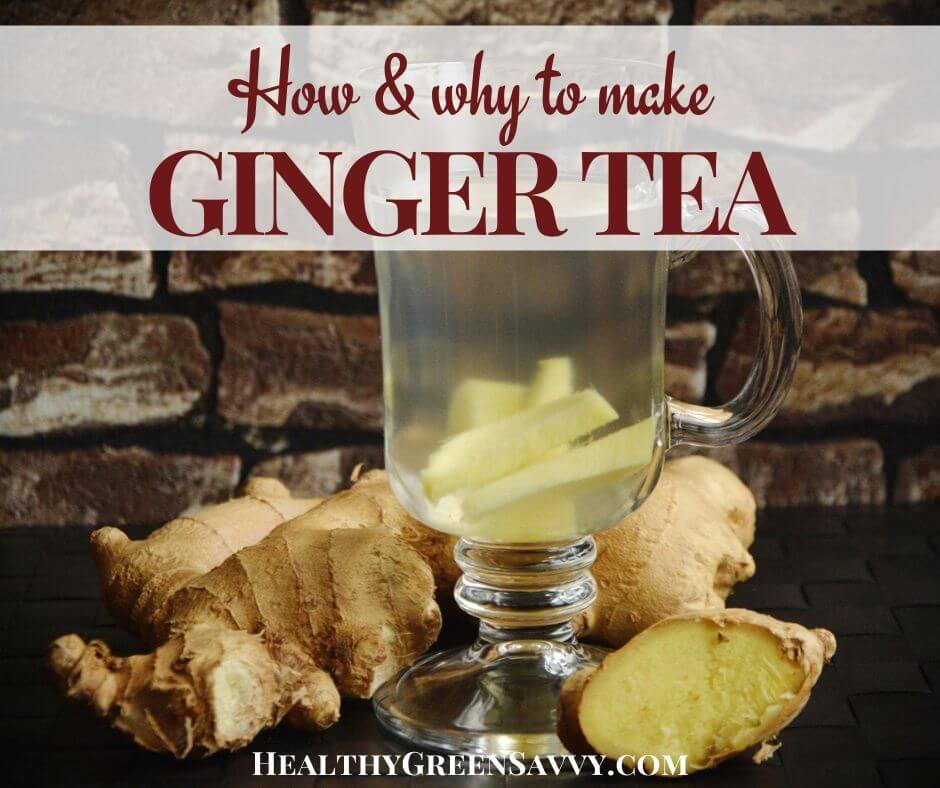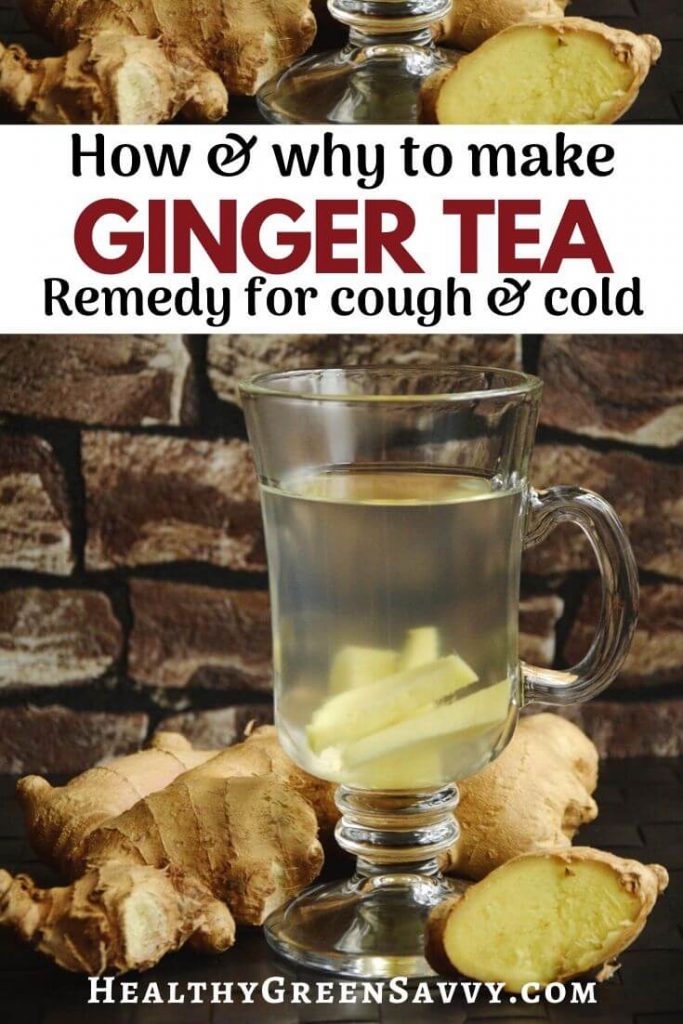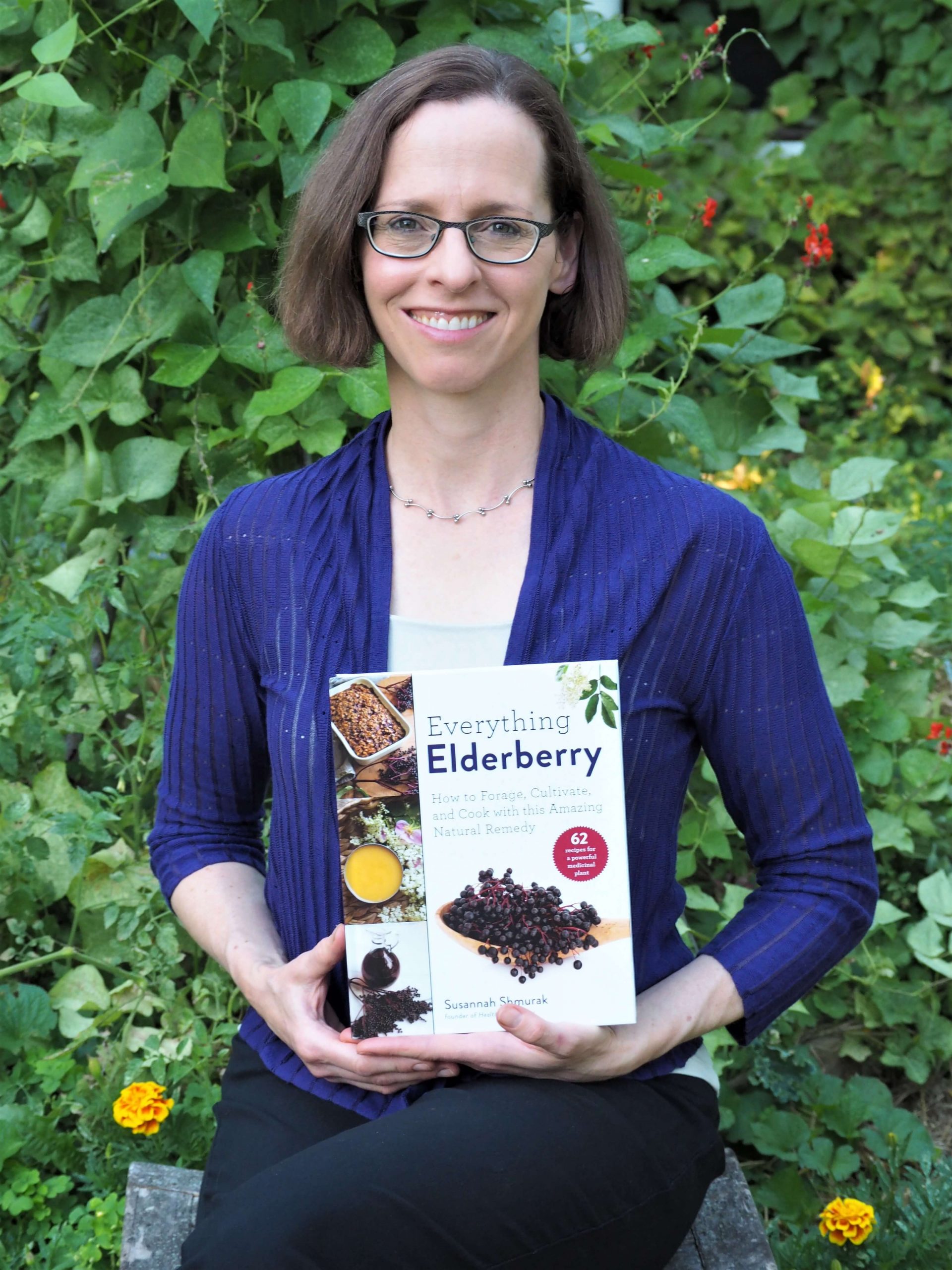Last Updated on January 31, 2025
Did you know you have many useful herbal remedies in your kitchen right now? Ginger is an easy-to-get but often overlooked ally in the battle against viruses and symptoms of respiratory infections. Find out about the many benefits of ginger and how to make ginger tea for colds and to support good health.
Turn to ginger when you feel those telltale symptoms of an impending cold, or use it to treat cold symptoms you already have. It’s one of those great natural remedies for colds we can all use that has additional benefits for health (with some caveats — see cautions below).

BENEFITS OF GINGER ROOT TEA
An aromatic root often enjoyed in cooking, ginger has numerous health benefits. A close relative of turmeric, ginger also has anti-inflammatory properties that help reduce pain, especially from inflammatory conditions like arthritis. You’re probably already familiar with its use to treat nausea, and it has also been studied for its beneficial effects on brain health.
Ginger’s antiviral and antimicrobial activity makes it especially useful when you feel yourself coming down with something. I spent a lot of time last fall reading books by top herbalists, and time and again I found them singling out ginger as a favorite for dealing with colds and respiratory complaints. Herbalist Rosalee de la Forêt has much to say about the uses for and benefits of ginger.
Rosemary Gladstar calls ginger one of “our kitchen medicine miracles.” (Another one is garlic. Read more about the health benefits of garlic here. It’s also used for warding off viruses.)
If you love the idea of working beneficial foods like ginger into your diet more often, check out these other top superfoods.
WHAT ARE THE BENEFITS OF GINGER TEA FOR COLDS AND OTHER CONDITIONS?
Aside from its antiviral properties, ginger is warming and helps relieve congestion, both helpful when you’re dealing with cold symptoms.
Herbs that support immune function or that help respiratory symptoms can enhance the body’s ability to ward off viruses and make it more likely our symptoms will be mild.
Ginger root was one of the first things I put on my real-food kitchen supply list prior to our state’s stay at home order. I have plenty of ginger ready to bolster my immune system and treat respiratory symptoms. Here are some other immune-boosting foods to consider as you’re thinking about the important link between a nutritious diet and your health.
Elderberries are another popular go-to for reducing the duration and severity of symptoms, which is why it’s always in my home apothecary. I made sure to have plenty on hand for making homemade elderberry syrup (with ginger and other herbs), tincture, and gummies to deal with this season’s onslaught of germs.
Cautions to be aware of before consuming ginger tea:
As with any herbal remedy, you need to do your homework. Ginger root has some properties you and your doctor need to consider if you have certain health conditions or are taking certain medications, especially blood thinners. Here’s more on side effects and interactions to know about before consuming ginger root.
HOW TO MAKE GINGER TEA FOR COLDS
There are all kinds of recipes for ginger tea on the interwebs, and how you prepare it may be largely a matter of personal preference. Don’t worry too much about precise measurements; getting ginger’s potent compounds into your system is the point here.
But let’s make the process as simple as possible, because why wouldn’t we? Some recipes require you to boil the tea for a period of time on the stovetop, which I don’t recommend for a couple reasons.
- Who wants another pot to wash???
- Boiling might destroy heat-sensitive compounds, and it’s not necessary. We simmer (not boil) certain items with harder-to-extract medicinal compounds, like elderberries, but fresh ginger releases its compounds pretty readily. Plus, I recommend eating the leftover ginger when you’re done, just to get everything out of it you can.
We’re going to steep our ginger in boiling water and avoid having to remember something’s cooking on the stove in these distracted times. When you’re done, you can rinse out your teapot or infuser cup and brew up another healing tea. How about some antioxidant-rich hibiscus or soothing lemon balm? Green tea also has antiviral properties.

To peel or not to peel?
Most recipes tell you to peel your ginger, while a few renegades say it’s not necessary. Leaving the peel on saves a little time, always a good thing. It also cuts waste, as you don’t lose the ginger that’s stuck to the peel, which can be considerable if you’re using a knife to cut away the peel. Try a spoon instead.
If you’d rather, you can peel your ginger, but consider using the peel in homemade broth so it doesn’t go to waste. Here are more than 40 root-to-stem recipes to help you reduce food waste even more.
But let’s keep things as simple as possible. Skip the peeling and use the extra time to browse other health hack posts on this site. (Just a suggestion!)
Speaking of peels, I like to add orange peel to my ginger tea for flavor and additional health benefits — as well as cutting food waste. Orange peels are used in Chinese medicine for treating congestion and coughs, making this a natural combination for cold season. You can also make orange peel tea on its own. Here are lots more uses for orange peels to check out.
Lemon and ginger are a traditional combination, so if that’s more your speed, go ahead and add lemon. But I think the orange peel adds a lovely flavor and with its specific benefits for congestion and cough, orange peel strikes me as an exceptionally savvy choice. Let me know what you think!
Elderberry tea can be made with ginger as well, and is also a terrific herbal remedy for cough and cold. Here are loads more home remedies for cough if you need them.
NOT IN THE MOOD FOR TEA?
If too many cups of ginger tea sounds a little daunting, know that some diced fresh ginger works beautifully in broths and soups as well. So if you’re feeding yourself some nourishing soup to help with cold symptoms, toss in some ginger for extra support. A simple cup of broth with plenty of diced ginger (and some minced garlic if you want to add more antiviral power to your soup) may help you kick a cold before it can take hold.
You can also try making a simple tincture with fresh or dried ginger to extract the beneficial compounds more efficiently. You only need a few drops of tincture to get the benefits of ginger, plus tincture is highly portable. Check out the easy ginger tincture recipe.
Here are a bunch more herbs for colds that can help alleviate congestion, sore throats, and more. Thyme is a great choice and goes nicely with ginger. If you want to combine them, here’s a thyme tea recipe to try.

Ginger Tea for Colds and Coughs
This easy ginger tea for colds combines the medicinal properties of ginger with those of orange peels. Both are helpful for treating coughs and congestion, and have numerous other health benefits as well. This warming and tasty tea will be a go-to for your next cold, but is also a great recipe for adding antioxidants to your diet or helping with natural pain relief.
Ingredients
- 2 cups boiled filtered water
- 2 tablespoons fresh ginger, finely sliced, minced or grated
- 3 heaping tablespoons fresh orange peel, chopped into small pieces, or 1 1/2 tablespoons dried (optional)
Instructions
- Add ginger and orange peel to a teapot.
- Cover with boiled water and allow to steep at least ten minutes, longer if possible.
- Strain and enjoy. Add sweetener if desired. Honey would add to the soothing properties of the tea if you're treating a cough or sore throat.
Notes
The amounts of water, ginger and orange peel don't need to be exact. Estimate if you like, and play around with the ratios to suit your taste. Enjoy!
Nutrition Information:
Yield: 2 Serving Size: 1Amount Per Serving: Calories: 14Total Fat: 0gSaturated Fat: 0gTrans Fat: 0gUnsaturated Fat: 0gCholesterol: 0mgSodium: 11mgCarbohydrates: 3gFiber: 1gSugar: 0gProtein: 0g
Nutritional information was auto-generated based on serving size, number of servings, and typical information for the ingredients listed. To obtain the most accurate representation of the nutritional information in a given recipe, please calculate the nutritional information with the actual ingredients and amounts used, using your preferred nutrition calculator. Under no circumstances shall this website or author be responsible for any loss or damage resulting for your reliance on the given nutritional information. You are solely responsible for ensuring that any nutritional information provided is accurate and complete.
Can You Grow Your Own Ginger?
If you love growing your own natural remedies, you’ll surely be asking yourself right now if you can grow ginger at home. Though it can take awhile to get going, unlike many other food crops that require a lot of space, ginger is one absolutely anyone can grow on a windowsill. All it takes is a pot of soil.
You can also grow ginger outside as a perennial if you live in a very warm climate. Here are 35 other herbs that can grow in shade.
Here’s info on how to grow ginger from Practical Self Reliance. Since learning about the many health benefits of ginger, I’ve started using ginger so much, I’m thinking of trying this myself if I can find a window where our cat won’t get at it.
I hope you love this ginger tea recipe as much as I do. Wishing you very good health!
Pin to save this ginger tea for colds recipe for later!

Disclaimer: I’m a health enthusiast and writer/researcher, not a medical professional. Content on this website is intended for informational purposes only and is not meant to provide personalized medical advice. I draw on numerous health sources, some of which are linked above. Please consult them for more information and a licensed professional for personalized recommendations.
Photo credits: congerdesign

Susannah is a proud garden geek and energy nerd who loves healthy food and natural remedies. Her work has appeared in Mother Earth Living, Ensia, Northern Gardener, Sierra, and on numerous websites. Her first book, Everything Elderberry, released in September 2020 and has been a #1 new release in holistic medicine, naturopathy, herb gardening, and other categories. Find out more and grab your copy here.
 Hi, I'm Susannah, a garden geek, energy nerd, and fan of healthy food and natural remedies. Need some simple, practical solutions for living healthier and greener? You've come to the right place! More about me and my green projects
Hi, I'm Susannah, a garden geek, energy nerd, and fan of healthy food and natural remedies. Need some simple, practical solutions for living healthier and greener? You've come to the right place! More about me and my green projects
Leave a Reply